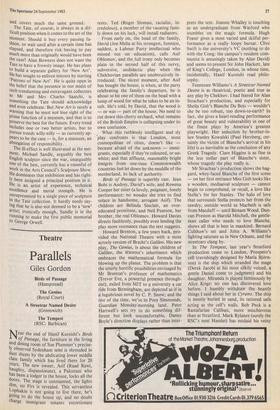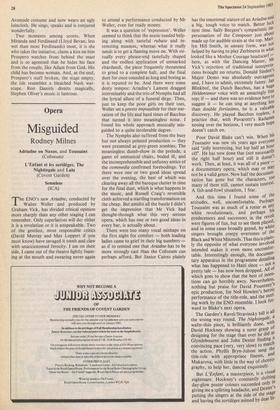Theatre
Parallels
Giles Gordon
Birds of Passage (Hampstead) The Genius (Royal Court) A Streetcar Named Desire (Greenwich) The Tempest (RSC: Barbican) Near the end of Hanif Kureishi's Birds of Passage, the furniture in the living and dining room of Sue Plummer's precise- ly observed Sydenham semi is shrouded in dust sheets by the abdicating lower middle class family which has lived there for 20 years. The new owner, Asif (Raad Rawi, haughty, dispassionate), a Pakistani who has been a lodger in the house, locks all the doors. The stage is untenanted, the lights dim, no Firs is revealed. This servantless Lophakin is not going to live there, he's going to do the house up, and no doubt charge immigrant tenants extortionate
rents. Ted (Roger Sloman, racialist, in- credulous), a member of the vacating fami- ly down on his luck, will install radiators.
From early on, the head of the family, David (Joe Melia at his strongest, funniest, saddest, a Labour Party intellectual who missed out on education), calls Asif Oblomov, and the full irony only becomes plain in the second half of this nervy, subversive, undidactic play when the Chekhovian parallels are unobtrusively in- troduced. The nicest moment, after Asif has bought the house, is when, at the party celebrating the family's departure, he is about to hit one of them on the head with a lump of wood for what he takes to be an in- sult. He's told, by David, that the wood is — or was — part of the house. No need to cut down this cherry orchard, what remains of the British Empire is collapsing under its own confusion.
What this ruthlessly intelligent and sly play confronts is that London, most cosmopolitan of cities, doesn't like because afraid of the unknown — immi- grants, especially if they're coloured, or un- white; and that affluent, reasonably bright emigres from one-time Commonwealth countries feel let down by the muddle of the motherland, its lack of authority, Birds of Passage is superbly cast. Jean Boht is Audrey, David's wife, and Rowena Cooper her sister (a lovely, poignant, lonely performance: no wonder she tries to find solace in handsome, arrogant Asit). The children are Belinda Sinclair, an over- educated prostitute, and Neil Pearson, her brother, the real Oblomov. Howard Davies directs faultlessly, possibly even lending the play more resonance than the text suggests.
Howard Brenton, a few years back, pro- vided the National Theatre with a most actorly version of Brecht's Galileo. His new play, The Genius, is about the children of Galileo, the s'cientist's inheritance which embraces the mathematical formula for blowing up the planet. The problem is that the utterly horrific possibilities envisaged by Mr Brenton's professor of mathematics (Trevor Eve, a powerful presence through- out), exiled from MIT to a university a car ride from Birmingham, are depicted as if in a lugubrious novel by C. P. Snow; and the rest of the time, we're in Posy Simmonds, Guardian Monday-morning land. Peter Hartwell's sets try to do something dif- ferent but look uncomfortable, Danny Boyle's direction displays rather than inter-
prets the text. Joanne Whalley is touching as an undergraduate from Watford who stumbles on the magic formula. Hugh Fraser gives a most varied and skilful per- formance as a really loopy bursar. Clive Swift is the university's VC (nothing to do with the Cong: the campus's resident com- munist is amusingly taken by Alan David) and seems to present Sir John Hackett, late of King's College, London, in whose time, incidentally, Hanif Kureishi read philo- sophy.
Tennessee Williams's A Streetcar Named Desire is as theatrical, poetic and true as any play by Chekhov. I had feared for Alan Strachan's production, and especially for Sheila Gish's Blanche Du Bois — wouldn't she be too robust, too down-to-earth? in fact, she gives a heart-rending performance of great beauty and vulnerability in one of the finest plays by America's greatest playwright. Her seduction by brother-in- law Stanley Kowalski (Paul Herzberg, cer- tainly the victim of Blanche's arrival in his life) is as inevitable as the conclusion of any Greek Tragedy. Clare Higgins is as fine in the less stellar part of Blanche's sister, whose tragedy the play really is.
Mr Strachan's production shows the hag- gard, whey-faced Blanche of the first scene — on her first entrance Miss Gish looks like a wooden, mediaeval sculpture — cannot begin to comprehend, or recall, a love like Stella's for her Stanley. The halo of love that surrounds Stella protects her from the tawdry, outside world as Macbeth is safe from Macduff — until Birnam Wood. Dun- can Preston as Harold Mitchell, the gentle- man caller who needs to love Blanche, shows all that is best in mankind. Bernard Culshaw's set and John A. Williams's lighting saturate us in New Orleans, and the streetcars clang by.
In The Tempest, last year's Stratford production come to London, Prospero's cell (ravishingly designed by Maria Bjt5rn- son) is the ship which stranded the mage (Derek Jacobi at his most silkily voiced, a gentle Daniel come to judgment) and his daughter. Miranda is played luminously by Alice Krige: no one has discovered love before. I humbly withdraw the beastly things 1 said about her in Cyrano. The ship is mostly buried in sand, its tattered sails acting as the cell's walls. Bob Peck is a Rastafarian Caliban, more mischievous than at Stratford. Mark Rylance (surely the RSC's next Hamlet) has mislaid his veiny
Avonside costume and now wears an ugly loincloth. He sings, speaks and is conjured wonderfully, Two moments among scores. When Miranda and Ferdinand (Lloyd Bevan, less wet than most Ferdinands) meet, it is she who takes the initiative, clams a kiss on him Prospero watches from behind the mast and is so agonised that he hides his face from the couple, like Adam from God. His child has become woman. And, at the end, Prospero's staff broken, the stage empty, the isle resembles a bleached Nash war- scape. Ron Daniels directs magically, Stephen Oliver's music is lustrous.







































 Previous page
Previous page